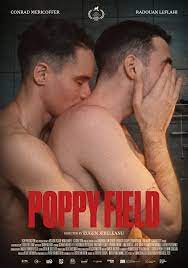
POPPY FIELD/ CAMP DE MACI
Romania, 2020, 82 minutes, Colour.
Conrad Mericoffer, Alexandru Potocean, Radouan Ldflahi, Cendana Trifan Alex Calin.
Directed by Eugen Jebleeanu.
A brief Romanian film focusing on sexuality, sexual orientation, homophobia, national legislation.
With its confined action to an apartment and to a cinema for most of the plot, and the reliance on dialogue and issues, the screenplay could have been a piece of theatre.
The film indicates that there is a great deal of homophobia in post-Communist Romania, those in same-sex relationships having to keep this secret, not wanting to be exposed and shamed, and not wanting to lose employment.
The central character, a policeman, is having an affair with a flight attendant from Germany. The opening sequences focus on them in the apartment. But, then, the policeman goes to work, call to a riot in a cinema where the police have invaded the screening of a lesbian film, upsetting those who have bought tickets, loud slanging matches. But, they are overwhelmed by the number of protesters, banners, Christian icons, loud, condemnations of homosexuality. Some of the protesters are particularly strident and shouting, especially an older woman who symbolises the protesters.
However, the policeman encounters a young man with whom he had an experience earlier, hitting him, the young man then going to the police to tell the truth.
A great deal of the film shows the policeman kept apart in the empty cinema all, discussions with the police, those supporting him, those condemning homosexuality.
There is a long sequence in the car with the policeman talking to his superior – leaving the audience wondering about their relationship and the final farewell, kisses.
The film takes his place along with so many others about homophobia, the criminalisation of homosexuality, and a look at Romanian society as it emerged from the communist era.
- Romania in the 2020s? Moral issues? Homophobia? Religion?
- The Romanian city setting, apartments, police precincts, the streets, the cinema, interiors? The musical score?
- Issues of homophobia, the traditions of the Communist palace, the transitions from communism, the calling out of 60-Marxism? Religious demonstrations?
- The story of the in this context? Background, stories about his mother, the visit of his sister and his relationship with her, his homosexuality, secret, revelation of liaison is in the past, his police reputation, his relationship with Hadi, the demonstration of the cinema, observing, interacting, the challenge from the man, hitting him, wanting to interrogate him? The reaction of his fellow officers? Homophobic? Supportive?
- Meeting with Hadi, flight attendant, from Germany, the liaison, beating, parking, the elevator, in the house, sexual atmosphere, yet Christi’s tone, going to work, not wanting a trip to the mountains, the visit of his sister, the gifts of food, her chatting with Hardy?
- Christi going to work, the demonstration, the audience, the cinema, the lesbian film, the demonstrators, the older woman and her shouting, the banners, the icons? The reaction of the audience, civil rights, paying to see the film? The police reaction, wanting to see ID, the crowd reacting, their rights? The various individuals and their reactions, stances?
- The gay man, challenging Christi, asking him, taunting him, the fight, Christi hitting him, his speaking to the police, about Christi and his past, the police reaction, supportive of Christi?
- Christi, in the empty cinema, the reactions of the various police, conversations, keeping Christi apart, reporting to the authorities? Is eventually getting out? Anger?
- The superintendent, the conversations with Christi, their friendship, the scene in the car and the long conversation and story, Christi listening, driving him away at the end, letting him go home – and the final subtitle, Kisses?